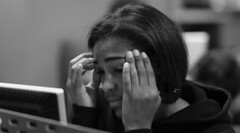As you leisurely click from one Facebook photo to the next, you eventually realize you’ve just spent 45 minutes staring at pictures of that kid you kind of knew from your statistics class last semester.

The words “procrastination” and “Facebook” have almost become synonymous, but the pressure is on to focus during finals week.
“Just having [finals] back to back is stressful,” said Katlyn McDevitt, a junior human resource management major. “You can never get a break, and it constantly feels like you’re just trying to catch up.”
“I’m a procrastinator, unfortunately,” said sophomore biochemistry major Jashira Fraticelli. “I sometimes end up cramming for a week, and when I do that, my brain shuts down as soon as I see the exam.”
Chronic procrastination is a little more involved than a simple self-diagnosis.
Dr. Joseph Ferrari, a professor at DePaul University in Chicago, specializes in procrastination theory and is the author of several publications such as Procrastination and Task Avoidance: Theory, Research and Treatment.
Ferrari points out that while everyone procrastinates, not everyone is a procrastinator.
“It’s chronic procrastination if you’re letting it affect your relationships, home and schoolwork, and you’re part of the 20 percent that should seek therapy,” Ferrari said. “But for the other 80 percent, it’s just something that is unpleasant.”
For those who identify with the 80 percent, tips on what to avoid during Dec. 15 to 20 can help beat the slump.
Get offline.
Without boundaries, it’s easy to let the Internet lull you into a hypnotic state.
Fenil Amin, a freshman information sciences and technology major, agrees that finals week calls for more studying and less Web surfing.
“Online chatting is what distracts me the most,” Amin said. “You need to back away and just try to concentrate on your work.”
Ferrari’s research also shows a correlation between Internet usage and students’ study habits – the more time spent on the Web, the more likely they are to procrastinate.
If you know you’re not going to be able to concentrate on completing an essay until you’ve checked TUmail, Blackboard, Craigslist and Facebook, then check them. Just be efficient about it.
Stop making excuses.
Ferrari said 70 percent of the time when students procrastinate and give their professors excuses they’ll later admit were lies.
Don’t waste time rewriting the story of your grandma’s third death or conjuring up gruesome details from your nonexistent stomach flu. Take the time to realize whatever you have to do eventually needs to be done.
McDevitt says mapping out study times in a planner is her key to final week success.
“You just need to sacrifice your time,” McDevitt said. “Just realize that it’s just this one week, and afterwards you can catch up on all the sleep you’ve been missing.”
Reward yourself.
“Professors rarely reward students for doing things early,” Ferrari said. “We don’t give the early bird the worm in this country anymore. We no longer reward people for doing things on time, but we still punish them for being late. It sets a tone.”
“I say to myself, ‘OK, Sunday I won’t touch a computer, and I’ll get straight to work so that Saturday I’ll be able to go out with my friends,’” Fraticelli said.
Give yourself similar incentives. It could be something literal – if you finish your term paper with enough time to have your teaching assistant proofread it, treat yourself to a night of reality TV and dessert.
Or it could be something as simple as a reminder. Sometimes, knowing you’ll be out of the TECH Center by 2 a.m. is incentive enough.
Come December 21, we’ll all be sleeping until noon and enjoying holiday home cooking. But until your tests are an eggnog-induced afterthought, push past procrastination and ace those final exams.
“College students delay studying, going to class and making it to meetings, but if there’s a keg of beer in the room, they’ll be there,” Ferrari said. “It’s mainly academic procrastination, not a lifestyle problem.”
Maria Zankey can be reached at maria.zankey@temple.edu.



Be the first to comment